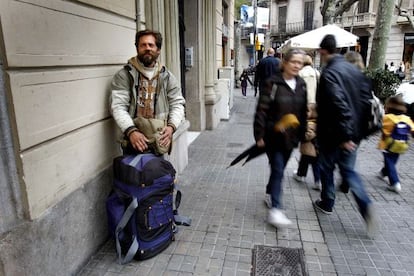Down and out in Catalonia
The number of homeless in Barcelona has risen by 32 percent since 2008 Charities say cuts are making it harder to help the most vulnerable

The corner where the streets Montaña-Besòs de Consell de Cent and the Rambla de Catalunya meet is one of Barcelona's most glamorous spots; a place where tourists stop to take photos, where executives amble by on their way to work, and families who live in the area take their children out for a stroll. For the last eight months it has also been a kind of home for Constantin Nedelcu, one of the Catalan capital's 2,800 men and women registered as homeless by City Hall.
"If it weren't for the people who have come to know me, things would be much worse. I have nowhere to live. What can I do if nobody will give me work?" asks the 45-year-old Romanian as settles down on the large bag where he carries a thin camping mattress.
Around 1,100 people sleep in refuges provided by Barcelona City Hall or NGOs and charities. A further 800 spend each night in the street, and a similar number find shelter in abandoned warehouses, dumped cars, or makeshift huts on waste ground, such as the one where four people died last week in the Poblenou district of the city. Barcelona has been keeping a count of its homeless since 2008, and the figures show a 32-percent increase, with growing numbers of people living in such improvised accommodation: the official figure is now 834.
Nedelcu sleeps in the entrance to the parking lot of an office block on the Rambla de Catalunya. He is woken early, and stuffs his mattress away, and hits the street to spend a long day panhandling. "I was a cobbler and builder in Romania. I fled because of political persecution. I left my parents and my son. I traveled through Italy and France, and last August I arrived here. I can't go back."
According to Barcelona City Hall's network of 27 centers that attend to the homeless, the typical profile of somebody sleeping in the street is a man aged between 26 and 45. Around two-thirds are from overseas, and more than 10 percent have some kind of mental health problem.
Nedelcu is able to use the bathroom in a nearby McDonalds to wash. "In the morning, when there aren't too many people, I go there and clean myself up; it's a bit primitive," he says, adding that he gets no help from the authorities because he is here without the necessary permits. He says that he is given food by local people. "The problem is that there are more and more of us asking for help."
Presenting its annual report last week, Barcelona City Hall's Homeless Attention Network said that the Catalan capital is no longer able to address the growing problem of people without a place to live. Researcher Albert Sales says that just over half of those sleeping in refuges are Spanish, and who are better able to access the little help that is available.
Barcelona has a total of 1,347 beds in refuges and residential centers, along with 416 in apartments owned mainly by charities and NGOs. There are 120 places in boarding houses, and a further 279 in rented accommodation. In the last four years, since City Hall started keeping figures, the homeless network has increased the number of beds it offers in apartments from 182 to 342.
But it says it can no longer keep up with the needs of the growing numbers of homeless people. Referring to what she called the "significant increase in homelessness," last week City Hall councilor Maite Fandos called on owners of apartments that are empty to facilitate them to its low-rent scheme that offers accommodation to people with nowhere to live.
City Hall and others working with the homeless say that they prefer to put people into apartments rather than refuges, as this helps to avoid institutionalizing people, and gives them a greater sense of normality, at least in the case of those who can still fend for themselves, or who are not suffering from mental health problems.
Cáritas, the Catholic Church charity, and the country's largest, says that the deep spending cuts that the Catalan regional government has been making over the last two years is making its work harder. It cites the case of Lili, a young woman who arrived in Spain from Paraguay two years ago, and who now lives in an apartment in the city after her baby was born with spina bifida. Cáritas helped her apply for welfare payments, but says there is less and less money available for those without work and unable to pay for a roof over their heads.
Tu suscripción se está usando en otro dispositivo
¿Quieres añadir otro usuario a tu suscripción?
Si continúas leyendo en este dispositivo, no se podrá leer en el otro.
FlechaTu suscripción se está usando en otro dispositivo y solo puedes acceder a EL PAÍS desde un dispositivo a la vez.
Si quieres compartir tu cuenta, cambia tu suscripción a la modalidad Premium, así podrás añadir otro usuario. Cada uno accederá con su propia cuenta de email, lo que os permitirá personalizar vuestra experiencia en EL PAÍS.
¿Tienes una suscripción de empresa? Accede aquí para contratar más cuentas.
En el caso de no saber quién está usando tu cuenta, te recomendamos cambiar tu contraseña aquí.
Si decides continuar compartiendo tu cuenta, este mensaje se mostrará en tu dispositivo y en el de la otra persona que está usando tu cuenta de forma indefinida, afectando a tu experiencia de lectura. Puedes consultar aquí los términos y condiciones de la suscripción digital.








































